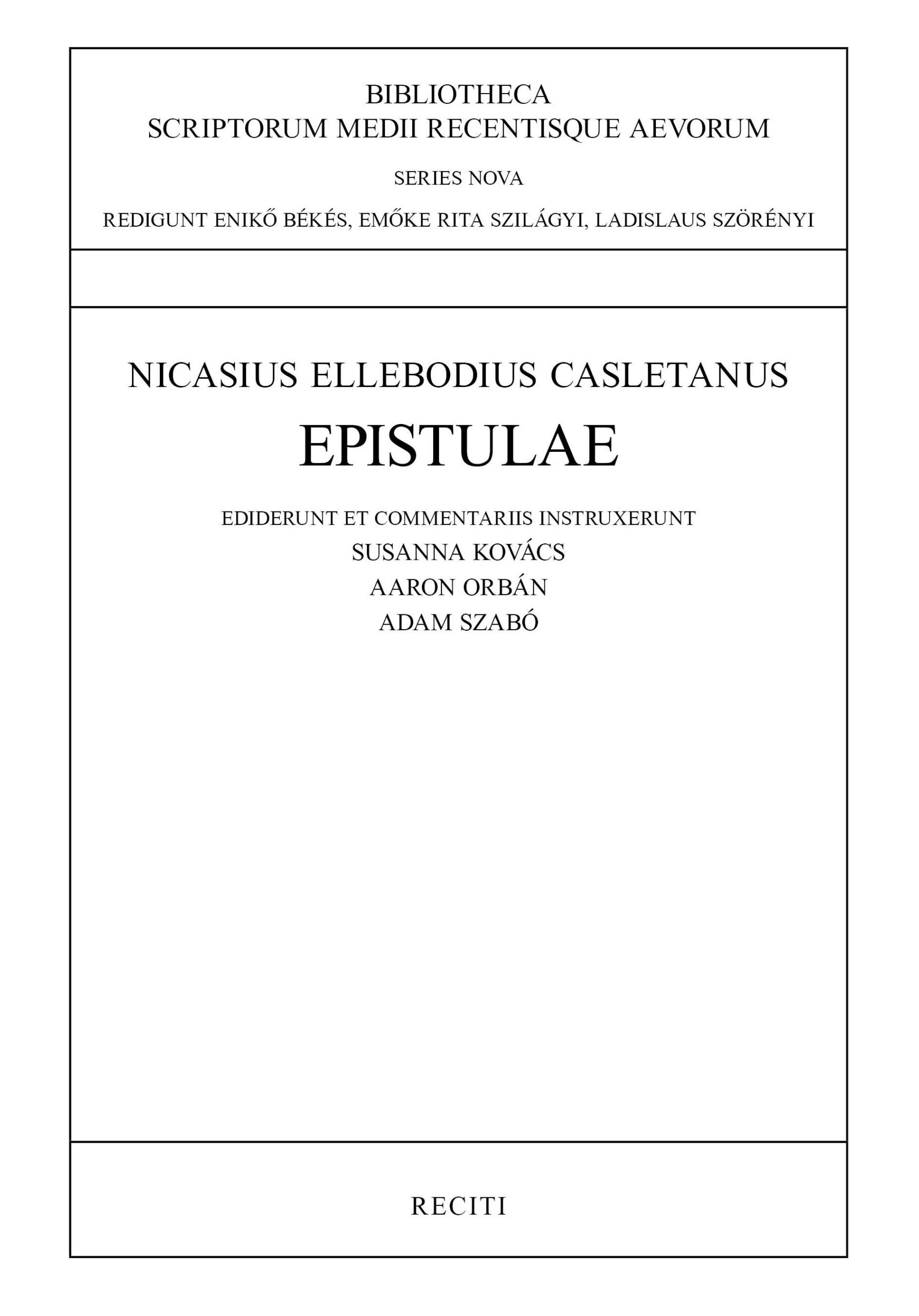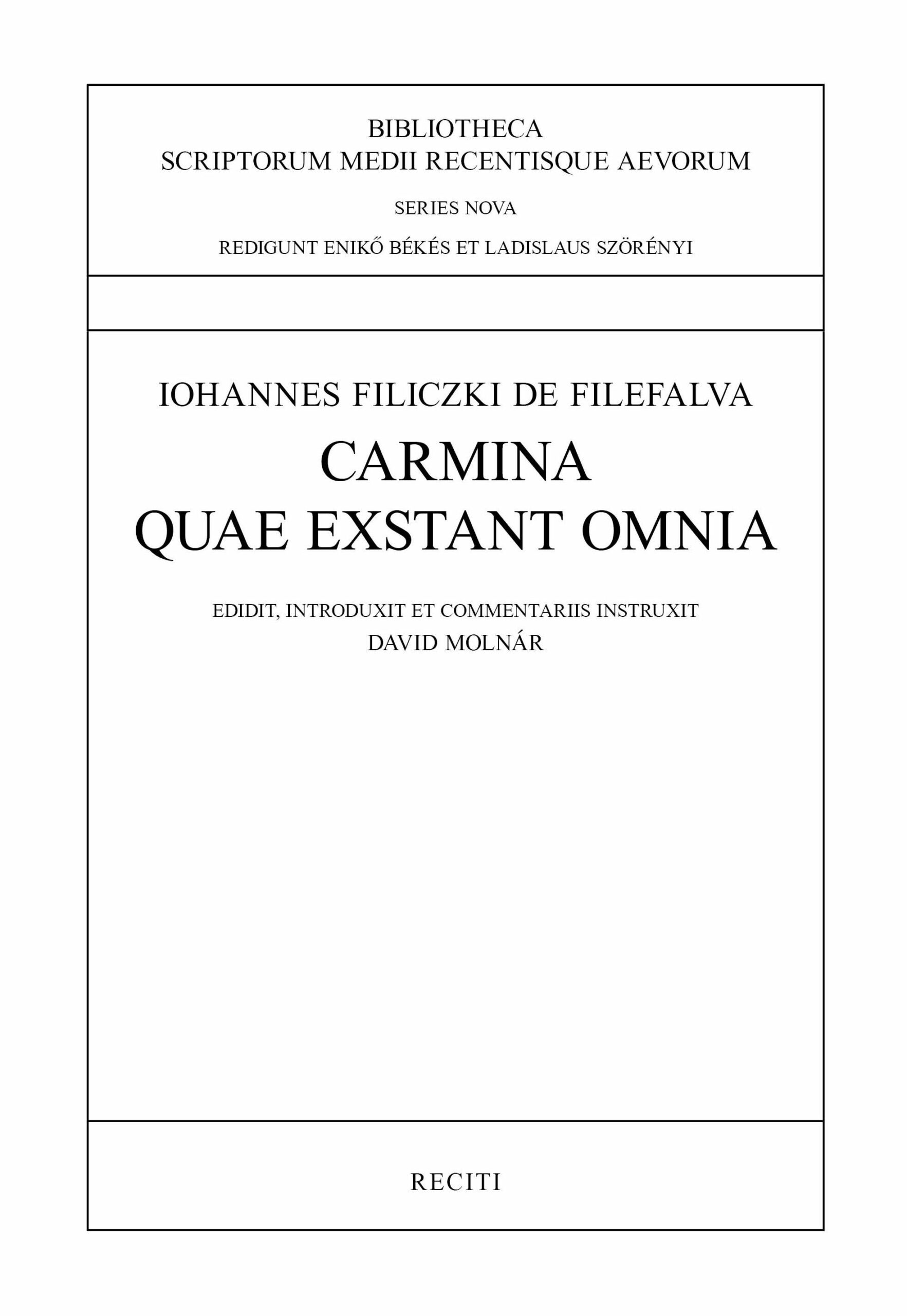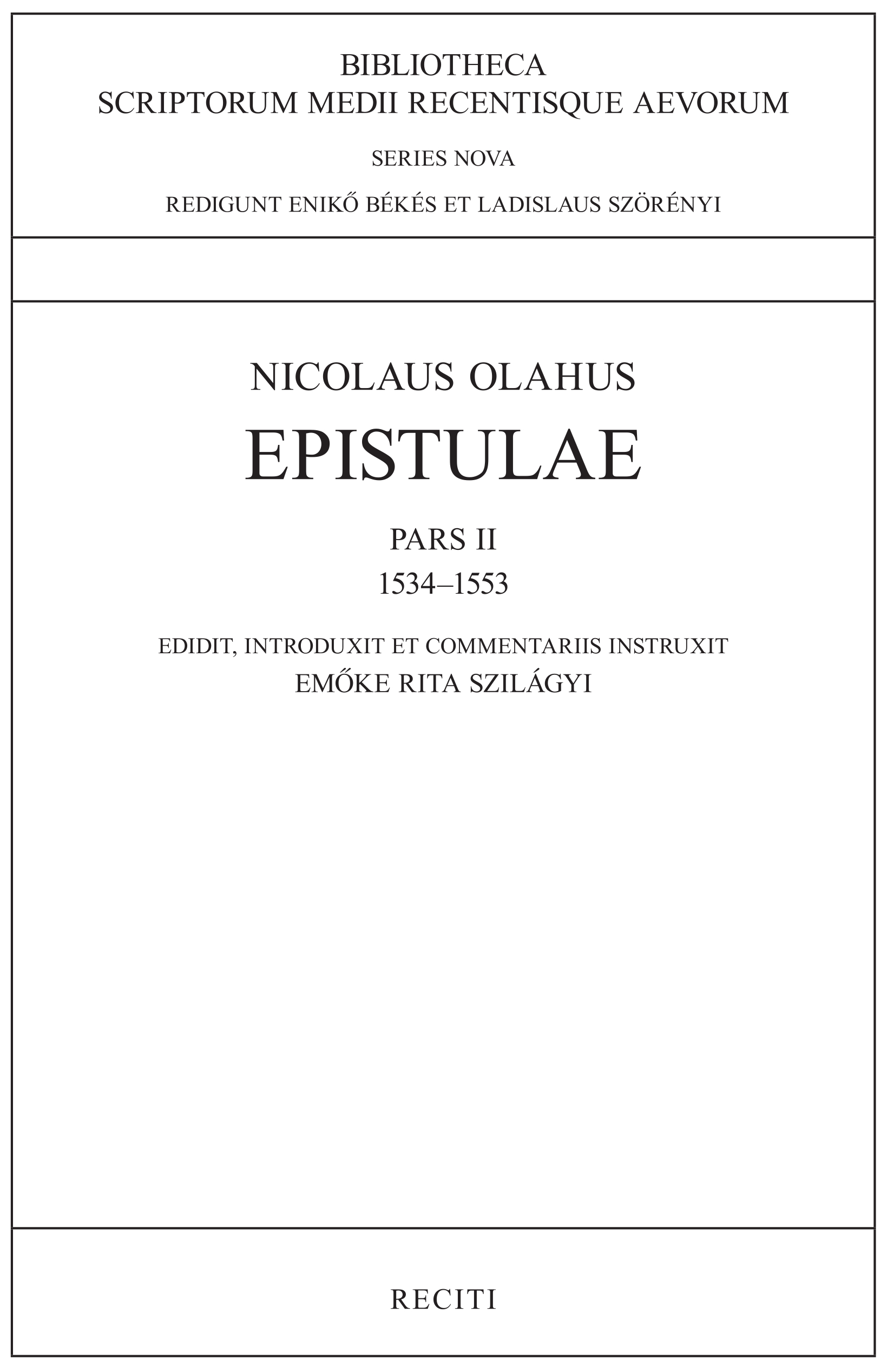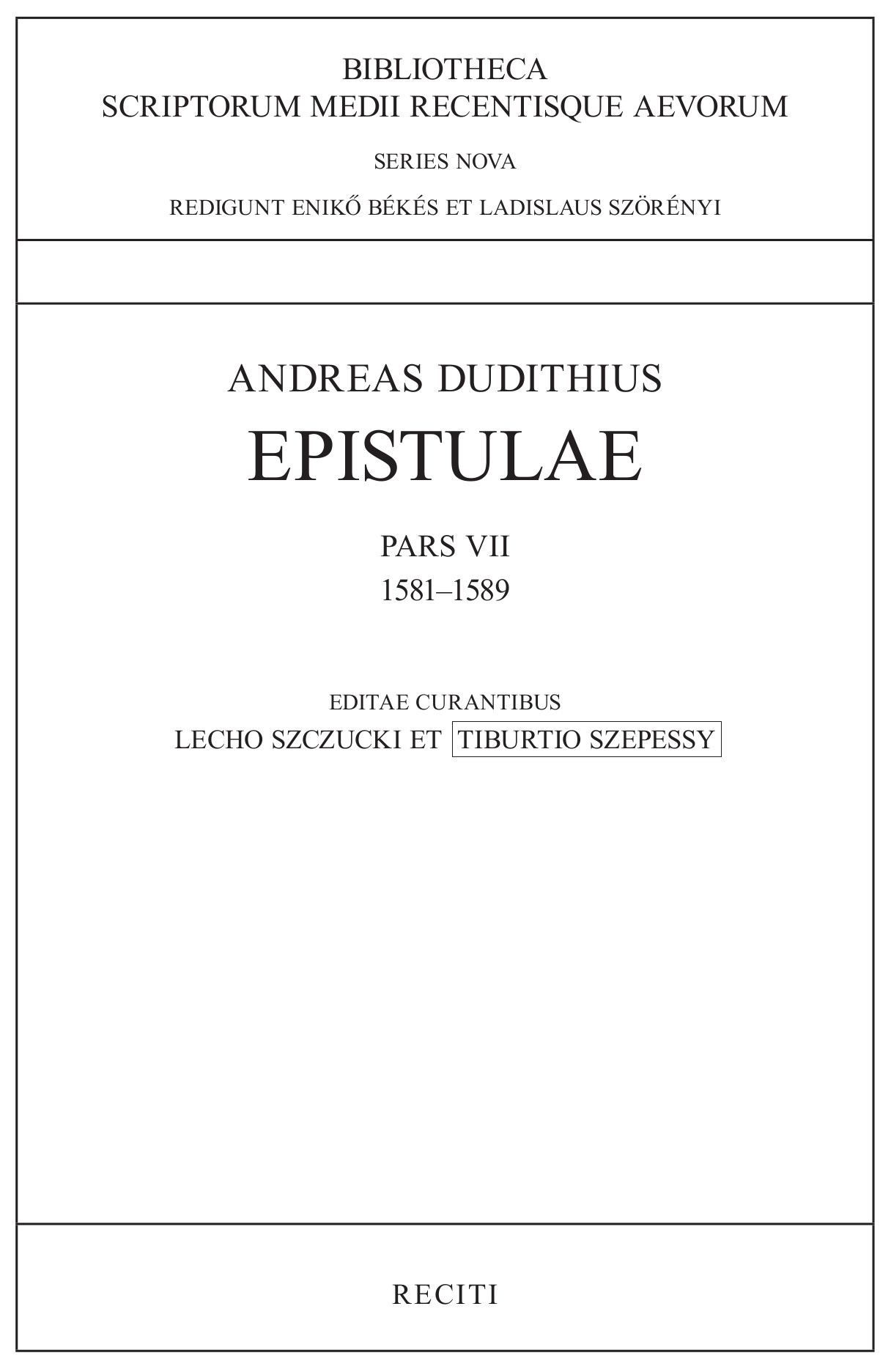2024. október 8. §
reciti book
Nicasius Ellebodius Casletanus, Epistulae. Ediderunt et commentariis instruxerunt Susanna Kovács, Aaron Orbán & Adam Szabó. Bibliotheca Scriptorum Medii Recentisque Ævorum. Series Nova 21. Budapest: Reciti Kiadó, 2024.

Nicasius Ellebodius Casletanus (1535–1577), a Flemish humanist and one of the most outstanding scholars of ancient Greek of his time, left a wealth of unpublished material due to his early death. His career was shaped by his studies in Padua, where he came into contact with eminent Italian humanists in the circle of Gian Vincenzo Pinelli. His only published work during his life was the editio princeps of Nemesius’s De natura hominis. He emended, translated into Latin, and commented on texts by Aristotle, Apollonius Dyscolus, Michael Synkellos, and Aristophanes, but all these remained unpublished when he died.
» Tovább a teljes szövegre «
2023. december 31. §
reciti könyv
Filiczki De Filefalva, Iohannes. Carmina Quae Exstant Omnia. Edidit, Introduxit Et Commentariis Instruxit David Molnár. 7. Bibliotheca Scriptorum Medii Recentisque Ævorum. Series Nova 20. Budapest: reciti, 2023.
 The oeuvre of Iohannes Filiczki de Filefalva (ca. 1583–1622) is almost completely unknown in Hungarian literary history, although some of his contemporaries called him the “second Ovid”. After a decade and a half of his peregrination in Germany and Switzerland, he returned to Hungary around May 1616, and worked as an assistant professor at the Calvinist school of Sárospatak. In 1622, he became the rector but died of the plague in August of the same year.
The oeuvre of Iohannes Filiczki de Filefalva (ca. 1583–1622) is almost completely unknown in Hungarian literary history, although some of his contemporaries called him the “second Ovid”. After a decade and a half of his peregrination in Germany and Switzerland, he returned to Hungary around May 1616, and worked as an assistant professor at the Calvinist school of Sárospatak. In 1622, he became the rector but died of the plague in August of the same year.
» Tovább a teljes szövegre «
2023. április 12. §
reciti book
Olahus, Nicolaus. Epistulae: 1534–1553. Edidit, introduxit et commentariis instruxit Emőke Rita Szilágyi. 2. Bibliotheca Scriptorum Medii Recentisque Ævorum. Series Nova 19/2. Budapest: Reciti Kiadó, 2022.

Miklós Oláh (1493–1568) is one of the most prominent humanists of the 16th century. Apart from his literary activity (book of letters, historical works, and poems), his fame is based on his political and ecclesiastical career. He reformed the operations of the Hungarian Royal Chancellery, and his patronage, book collection, and organizational talent made him well-known far and wide. After the battle of Mohács, he left Hungary and spent the 1530s years in the Low Countries on the side of Queen Mary of Habsburg, where he grounded his latter career.
» Tovább a teljes szövegre «
2019. szeptember 27. §
reciti könyv
Dudithius, Andreas. Epistulae: 1581–1589. Ediderunt Nicolaus Szymański et Ida Radziejowska. 7. Bibliotheca Scriptorum Medii Recentisque Ævorum. Series Nova 13/7. Budapest: reciti, 2019.
 Andreas Dudith (1533–1589), célèbre humaniste du 16 e siècle, nous a laissé, outre ses traités et traductions, une vaste correspondance dont la plupart n’a jamais été publiée. Parmi des correspondants de Dudith on relève les plus illustres personnages de la vie culturelle et politique de l’époque et les lettres s’étendent sur les sujets les plus variés, ce qui prête à cette correspondance une valeur documentaire.
Andreas Dudith (1533–1589), célèbre humaniste du 16 e siècle, nous a laissé, outre ses traités et traductions, une vaste correspondance dont la plupart n’a jamais été publiée. Parmi des correspondants de Dudith on relève les plus illustres personnages de la vie culturelle et politique de l’époque et les lettres s’étendent sur les sujets les plus variés, ce qui prête à cette correspondance une valeur documentaire.
» Tovább a teljes szövegre «
2019. január 15. §
reciti könyv
Olahus, Nicolaus. Epistulae: 1523–1533. Edidit, introduxit et commentariis instruxit Emőke Rita Szilágyi. 1. Bibliotheca Scriptorum Medii Recentisque Ævorum. Series Nova 19. Budapest: reciti, 2018.
 Miklós Oláh (1493–1568) is one of the most prominent humanists of the 16th century. Apart from his literary activity (book of letters, historical works, and poems), his fame is based on his political and ecclesiastical career. He reformed the operations of the Hungarian Royal Chancellery, and his patronage, book collection, and organizational talent made him well-known far and wide.
Miklós Oláh (1493–1568) is one of the most prominent humanists of the 16th century. Apart from his literary activity (book of letters, historical works, and poems), his fame is based on his political and ecclesiastical career. He reformed the operations of the Hungarian Royal Chancellery, and his patronage, book collection, and organizational talent made him well-known far and wide.
» Tovább a teljes szövegre «





You must be logged in to post a comment.